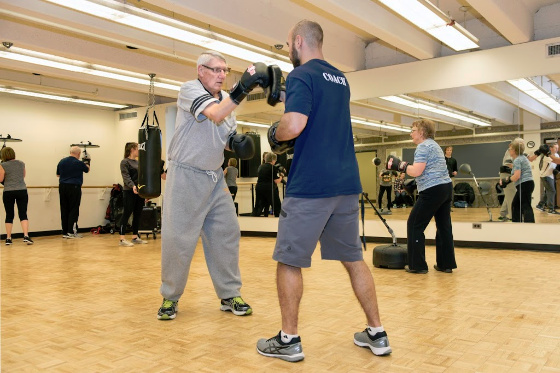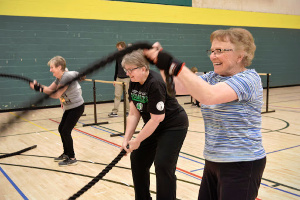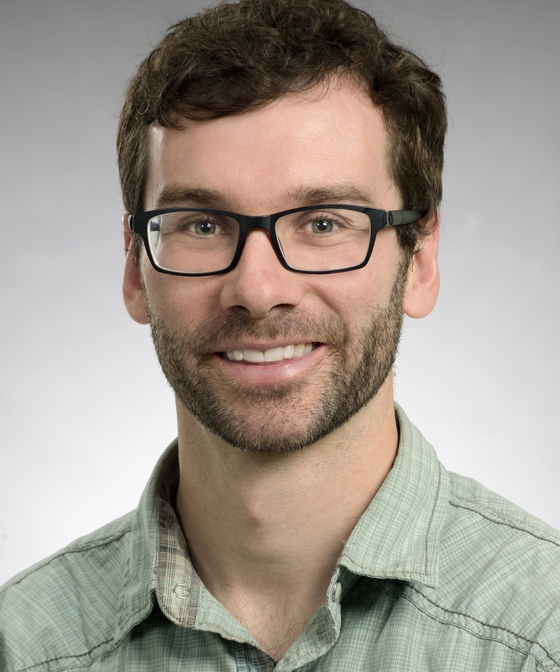
In-person-turned-online Rock Steady Boxing classes are now free and continue to create hope, laughter, and a sense of accomplishment in a non-clinical at-home environment. Photos: U of R Photography
Rock Steady Boxing - an affiliate program at the Dr. Paul Schwann Centre in the University of Regina's Faculty of Kinesiology and Health Studies - helps people with Parkinson's slow the progression of the disease. Participants engage in non-contact boxing exercises to improve their strength, balance, cardiovascular fitness, flexibility, and mobility.
So, when the classes were cancelled due to social/physical distancing protocols due to the COVID-19 pandemic, participants shared their concern about the impact of the loss of the helpful exercise regimen.

Now online classes will start off with a warm-up consisting of dynamic stretches, voice activation, stationary jogging and shadow boxing; strength exercises, and core work; and end with a cool-down of stretches, breathing, and a group cheer.
"Our clients were saying that they really noticed a difference in their fitness and symptoms when they were not able to attend the class two or three times a week," said Erin Tyson, CSEP Clinical Exercise Physiologist and Coordinator of the Dr. Paul Schwann Centre.
Staff jumped into action and Rock Steady Boxing was back, this time as free online classes - helping participants with Parkinson's disease remain healthy and active while social distancing.
Participant Lynda Pettigrew, says she was ecstatic when she learned the class would be moving online. Since joining Rock Steady Boxing more than a year ago, Lynda has experienced significant improvement in her coordination, strength, balance, and energy levels. Her tremors - a common symptom of Parkinson's disease - have also decreased in number.
"The boxing class has made it easier to do day-to-day things such as go for walks with my grandkids and work in the garden," she says. "When I'm sewing, my eye-hand coordination is better."
Tyson agrees, saying that it's incredibly important to try to help their clients maintain the level of function that they have gained from the class.
Over the past couple of weeks, four trial classes were held over Zoom, with 18 Rock Steady participants, the majority of who are over 65 years of age.
"The participants seem really happy that we're doing this for them, and they seem really open to trying the technology," said Tyson.
During the online class, the camera is positioned on Rock Steady Coach and Clinical Exercise Physiologist Patrick Bernat, who demonstrates the exercises in silence while Carmen Agar, Rock Steady Coach and Clinical Exercise Physiologist, voices the instructions.
"We're muting all of the participants," said Tyson, adding that the in-person class is typically quite loud, with upbeat music playing and the instructors enthusiastically shouting over the music to motivate everyone. "Muting the participants will allow them to play music in their homes if they want."
Tyson said she is on the hunt for affordable boxing equipment that people can purchase for home use. However, since the class mainly focuses on warm-up exercises, core strengthening exercises, and functional exercises, such as squats, lunges, and push-ups, equipment isn't necessary.
"As far as boxing in their homes goes, they can do air boxing or shadow boxing, which doesn't require gloves or a punching bag," said Tyson.
The online classes are accepting new participants, but as is the case with in-person Rock Steady Boxing classes, new clients must be referred by their doctor. With non-emergency doctor's appointments being done by phone or video conference nowadays, the Dr. Paul Schwann Centre has already received a few new referrals.

Dr. Cameron Mang, assistant professor in the Faculty of Kinesiology and Health Studies, who runs the Enrich Neurorehab program.
"We're going to contact those participants, do an online assessment through Zoom, and get them into the class as well," said Tyson.
Another community-based program offered by the U of R's Faculty of Kinesiology and the Dr. Paul Schwann
Centre, Enrich Neurorehab, is also moving online. This program, which helps adults living with chronic neurological conditions, provides participants with individualized exercises in a group setting. Moving the class online will offer clients the opportunity to exercise at home with the support and supervision of Dr. Cameron Mang, assistant professor in the Faculty of Kinesiology and Health Studies.
"We want to do the best that we can to look after all of our clients during this time," said Tyson. "I think it's really important to support our clients while they're in social isolation. We're providing them with the support to continue doing their programs at home, so they can stay fit and healthy and come back to us fit and healthy."
To offset the costs of moving the program online and offering it at no cost during this time, donations to the Dr. Paul Schwann Centre and its community-based programs are being accepted online. Click here for details.
Check out #UofReginaCares for more stories about U of R students, alumni, faculty, and staff who are using their ingenuity, resolve, and hearts to care for our community during these challenging times.











